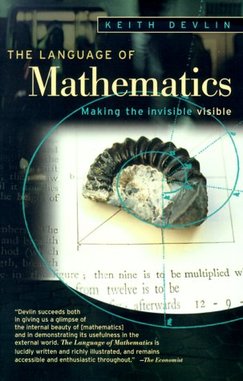Exploring “The Language of Mathematics” to discover how primes are used in cryptosystems.
It’s another prompt post today…
Something I read/learned this summer that intrigued me…

Although most of the books I’ve read this summer have been decidedly un-mathematical (for some reason, I’ve started reading history books about the War of the Roses), I did manage to read two chapters of The Language of Mathematics by Keith Devlin right at the start of the summer holidays. I’ve enjoyed what I’ve read so far, and am planning to finish it when I’m in a more mathematical frame of mind.
Everyone seems obsessed with prime numbers, and there’s usually a chapter on them in every maths book you pick up. I did learn something new from The Language of Mathematics though, and that’s how prime numbers are used in encryption systems for computers. Now, I already knew that primes were used somehow (some vague memory of a Coding Theory lecture from a few years ago), but wasn’t really sure how. Devlin admits that the description in the book is over-simplified, but it certainly gave me a handle on how the encryption and decryption systems work, and sparked an idea for a short activity to use in the classroom (coming later).
There are a few full explanations here, here and one from NRich aimed at KS5, but these involve modular arithmetic, so really wouldn’t work for most lower-school pupils.
However, I did find a nice YouTube video that explains the basic idea in a more accessible way.
The thing that intrigued me the most about using primes in cryptosystems is the fact that, while it’s very easy to generate large primes (we’re talking hundreds of digits in length) and then combine these two primes to make a composite number, it’s still incredibly difficult to decompose that composite back into its two primes.
It’s worth having a read about the RSA Factoring Challenge (now discontinued) – they state that, while factoring 100 digit numbers is “easy” with modern computers (which, in itself, seems mad, and really makes you reflect on just how powerful computers now are), no-one has publicly factored a number greater than 200 digits. On the FAQs they discuss the implications for Internet security as larger and larger primes are factored, and whether this means that certain cryptosystems are no longer reliable.